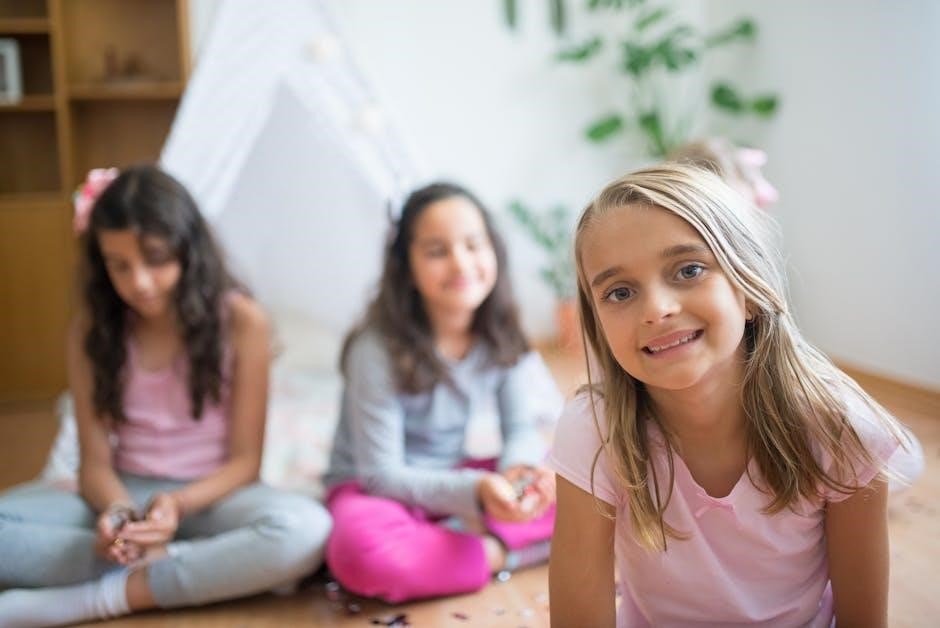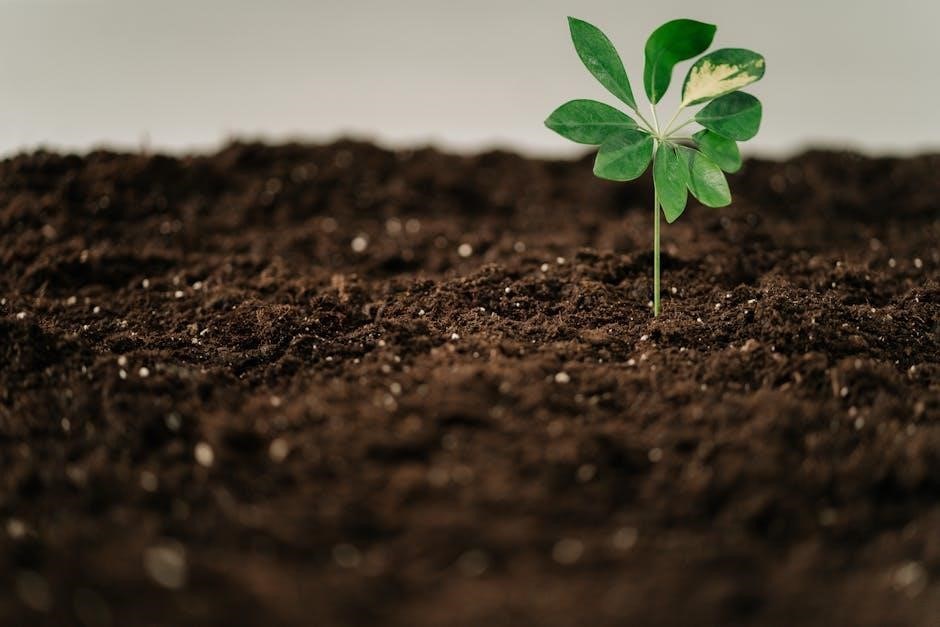Puberty is a natural journey marking the transition from childhood to adolescence. It brings biological and emotional changes, shaping identity and independence. This guide offers support and clarity, helping girls navigate this transformative phase with confidence and self-awareness.
Understanding Physical and Emotional Changes
Puberty triggers significant physical changes, such as growth spurts, breast development, and hormonal shifts. Emotionally, girls may experience mood swings, increased self-awareness, and sensitivity. These transformations are natural and essential for growth, helping girls develop a deeper understanding of themselves and their evolving identities during adolescence.
Preparing for the Journey of Adolescence
Adolescence is a life-changing phase requiring preparation and openness. Education about physical and emotional shifts helps girls anticipate changes. Open conversations with trusted adults and peers foster understanding. Embracing curiosity and self-exploration builds resilience, equipping girls to navigate this transformative period with confidence and a positive outlook on their future.
Understanding Your Body Changes
Puberty brings significant physical changes, including growth spurts, hormonal shifts, and the development of secondary sexual characteristics. Understanding these changes helps girls feel prepared and confident as their bodies evolve.
The Onset of Puberty and Hormonal Shifts
Puberty typically begins between ages 8-13, triggered by hormonal changes. Estrogen and progesterone levels rise, causing breast development, growth spurts, and menstrual cycles. These shifts can lead to emotional fluctuations and physical adjustments, marking the start of adolescence and preparing the body for future reproductive capabilities and overall maturity.
Hygiene and Self-Care Routines
Establishing a consistent hygiene routine is essential during puberty. This includes daily showers, using deodorant, and practicing proper menstrual hygiene to prevent infections. Regular skincare and hair care also help maintain confidence. Additionally, wearing clean, comfortable clothing and properly fitting bras supports overall well-being and self-care during this transitional phase.
Body Image and Self-Acceptance
Embracing your body image is crucial during puberty. Focus on nurturing self-acceptance by recognizing your unique beauty and strengths. Understand that everyone grows differently, and societal pressures often distort perceptions of beauty. Celebrate your individuality and prioritize self-worth over external expectations, fostering a positive and confident mindset throughout your journey.
Emotional and Social Development
Adolescence brings emotional growth, social exploration, and the development of confidence. It’s a time to build strong relationships, communicate effectively, and cultivate empathy while navigating life’s challenges.
Managing Mood Swings and Emotional Fluctuations
Mood swings during puberty are common due to hormonal changes. Girls can manage these feelings by communicating openly with trusted individuals, practicing self-care routines, and staying emotionally aware. Mindfulness techniques, exercise, and sufficient sleep also help regulate emotions, fostering a balanced and resilient mindset during this transformative phase.
Building Self-Esteem and Confidence
Building self-esteem during puberty involves embracing your uniqueness and celebrating strengths. Practice positive affirmations, set achievable goals, and surround yourself with supportive individuals. Recognize your worth, challenge negative thoughts, and engage in activities that boost confidence. Cultivating resilience and self-compassion will help you grow into a confident, empowered individual.
Navigating Social Interactions and Friendships
Navigating friendships and social interactions during puberty can be challenging but rewarding. Practice active listening, show empathy, and communicate openly. Embrace diversity, avoid comparisons, and build trust. Learn to handle disagreements respectfully and set healthy boundaries. Cultivating positive relationships will help you grow socially and emotionally, fostering lifelong connections.
Health and Wellness for Teen Girls
Health and wellness are crucial during adolescence, focusing on balanced nutrition, regular exercise, and sufficient sleep. Prioritizing mental well-being and self-care routines empowers teen girls to thrive and make positive lifestyle choices for a healthy future.
Nutrition and Exercise for a Healthy Lifestyle
A balanced diet rich in proteins, vitamins, and minerals fuels growth and energy. Regular exercise, such as sports or dancing, promotes physical fitness and mental well-being. Encourage healthy habits like meal planning and avoiding sugary snacks to support long-term health and a positive body image during adolescence.
Importance of Sleep and Mental Health
Quality sleep is vital for physical and mental rejuvenation. Teens need 8-10 hours nightly to support growth and cognitive function. Prioritize a consistent sleep schedule and a relaxing bedtime routine. Addressing stress and anxiety can improve sleep quality, promoting overall mental health and emotional stability during adolescence.
Setting Boundaries and Prioritizing Self-Care
Establishing healthy boundaries protects your emotional and physical well-being. Learn to say “no” when necessary and communicate your needs clearly. Prioritize self-care by engaging in activities that bring joy and relaxation, fostering a balanced lifestyle that supports mental and physical health during adolescence.
Relationships and Communication
Healthy relationships and effective communication are key to building trust and understanding. Learning to express feelings and listen actively fosters strong connections with family, friends, and partners, promoting emotional support and mutual respect during adolescence.
Understanding and Expressing Your Feelings

Recognizing and expressing emotions is crucial for emotional well-being. Girls can benefit from identifying their feelings, whether it’s joy, sadness, or anger, and learning healthy ways to communicate them. This fosters self-awareness, empathy, and stronger relationships with others, helping to navigate the challenges of adolescence with confidence and clarity.
Building Healthy Relationships with Family and Peers
Nurturing strong, respectful connections with family and friends is vital. Open communication, active listening, and empathy foster trust and understanding. Setting boundaries while showing support helps build lasting relationships, creating a network of encouragement and mutual respect during the journey of adolescence and beyond.
Dealing with Peer Pressure and Bullying
Peer pressure and bullying can be challenging, but staying true to yourself is key. Building resilience, seeking support from trusted individuals, and fostering self-confidence help navigate these situations. Remember, your worth isn’t defined by others—stay strong, communicate openly, and prioritize your well-being in all relationships.
Academic and Personal Growth
Academic and personal growth during adolescence involve balancing school, hobbies, and self-development. Setting goals, embracing challenges, and fostering a love for learning empower girls to thrive and succeed confidently.
Setting Goals and Developing a Growth Mindset
School and personal growth require balancing academics, hobbies, and self-improvement. Setting clear goals and adopting a growth mindset help girls embrace challenges, fostering resilience and confidence. This mindset encourages learning from failures and viewing obstacles as opportunities for growth, essential for long-term success and personal fulfillment.
Time Management and Balancing Responsibilities
Managing time effectively is crucial for balancing school, extracurriculars, and personal life. Prioritizing tasks and creating schedules help maintain focus and reduce stress. By learning to balance responsibilities, girls can achieve their goals while nurturing their well-being and personal growth, fostering a sense of accomplishment and confidence.
The Role of Education in Shaping Your Future
Education empowers girls with knowledge, skills, and confidence to pursue their dreams. It fosters critical thinking, creativity, and problem-solving abilities, preparing them for future challenges. By investing in education, girls gain the tools to make informed decisions, achieve personal growth, and contribute positively to society, shaping a brighter and more fulfilling future.

Navigating Crushes and Friendships
Crushes and friendships bring excitement and challenges. Learn to balance emotional connections, communicate openly, and prioritize self-care. Healthy relationships are built on trust, respect, and understanding, fostering emotional growth and confidence in social interactions.
Understanding Crushes and Romantic Feelings
Crushes are natural feelings that bring excitement and curiosity. They often involve admiration for someone, creating a mix of emotions like nervousness and joy. Understanding these feelings helps you identify boundaries and communicate openly, fostering healthy relationships built on mutual respect and trust, while embracing emotional growth and self-awareness during adolescence.
Building and Maintaining Healthy Friendships
True friendships are rooted in trust, respect, and open communication. Nurturing these bonds involves active listening, empathy, and support. Sharing experiences, celebrating successes, and standing by each other through challenges strengthen connections. Healthy friendships provide a foundation of belonging and joy, helping girls build confidence and a strong support system during their growth journey.
Dealing with Heartbreak and Disappointment
Heartbreak and disappointment are natural experiences during adolescence. Coping involves acknowledging emotions, seeking support from trusted individuals, and reflecting on lessons learned. Over time, resilience grows, helping girls understand their value and develop healthier relationships. This process fosters emotional strength and a deeper understanding of themselves and others.

Mental Health and Well-Being
Mental health is crucial during adolescence. Recognizing signs of anxiety or depression early can lead to timely support. Practicing mindfulness and seeking help when needed fosters emotional resilience and overall well-being.
Recognizing Signs of Anxiety and Depression
Monitor mood swings, persistent sadness, or withdrawal from activities. Notice changes in appetite, sleep patterns, or energy levels. Physical symptoms like headaches or stomachaches may also indicate emotional distress; Encourage open conversations and seek professional support when these signs persist, fostering a safe space for healing and growth.
Practicing Mindfulness and Stress Management
Engage in mindfulness practices like deep breathing, meditation, or journaling to calm your mind. Regular physical activity and creative outlets can reduce stress. Prioritize self-care routines and set realistic expectations to maintain emotional balance. Creating a daily mindfulness routine helps build resilience and fosters a peaceful, focused mindset.
Seeking Help and Support When Needed
Recognize when you need support and don’t hesitate to ask. Talk to trusted adults, friends, or professionals for guidance. Whether it’s emotional struggles or practical advice, seeking help is a sign of strength. Building a support network fosters resilience and ensures you’re never alone in navigating life’s challenges.

Personal Style and Individuality
Personal style is a powerful form of self-expression. Explore fashion, celebrate your uniqueness, and embrace diversity. Authenticity shines when you stay true to yourself.
Exploring Your Personal Style and Fashion
Discovering your personal style is a journey of self-expression. Experiment with trends, colors, and looks to find what makes you confident and unique. Fashion is a tool to reflect your personality and celebrate individuality. Embrace your preferences, whether classic, bold, or eclectic, and let your style tell your story authentically.
Celebrating Your Unique Qualities and Strengths
Embrace what makes you different—your talents, quirks, and personality. Everyone has something special to offer. Recognizing and celebrating your strengths fosters confidence and self-worth. By appreciating your uniqueness, you inspire others to do the same, creating a positive and inclusive environment for personal growth and self-expression.
Embracing Diversity and Being True to Yourself
Diversity enriches our world, and being true to yourself is key to happiness. Accept and celebrate differences in culture, beliefs, and identity. By embracing your authentic self, you set an example for others, fostering a culture of acceptance and mutual respect in all aspects of life and relationships.
Overcoming Challenges and Building Resilience
Resilience is key to navigating life’s obstacles. Learn to embrace challenges, adapt to change, and grow stronger through problem-solving, self-care, and maintaining a positive outlook on life.
Facing and Overcoming Obstacles
Obstacles are a natural part of growth. Girls can learn to identify challenges, develop problem-solving skills, and build resilience by breaking problems into manageable steps. Encourage self-compassion, seeking support, and celebrating small victories to foster confidence and determination. Every setback is an opportunity to learn and grow stronger.
Learning from Mistakes and Growing Stronger
Mistakes are valuable life lessons that foster growth and resilience. Encourage girls to reflect on errors, identify what went wrong, and apply these insights to improve. This process builds self-awareness, accountability, and confidence, helping them view challenges as opportunities to learn and evolve into stronger, wiser individuals.
Developing a Positive Outlook on Life
Cultivating a positive mindset helps girls navigate life’s challenges with resilience. Encourage gratitude, mindfulness, and self-compassion to foster optimism. Teach them to focus on solutions rather than problems, embracing each experience as a growth opportunity. This mindset empowers them to approach life confidently and view setbacks as stepping stones for success.
Embrace your journey with confidence, knowing growth brings strength. Celebrate progress and look forward to a bright, empowered future with resilience and joy.
Reflecting on Your Growth and Progress
Reflecting on your journey helps identify strengths and areas for improvement. Acknowledge achievements and lessons learned, fostering self-awareness and pride. Celebrate how far you’ve come, embracing the person you’re becoming with confidence and grace.
Looking Forward to the Future with Confidence
Embrace the future with optimism, knowing your growth and resilience will guide you. Set ambitious goals, trust in your abilities, and approach challenges with courage. The world awaits your unique contributions, empowering you to create a fulfilling and purposeful life.
Final Tips for a Successful Transition into Adulthood
As you step into adulthood, remember to embrace self-care, set clear goals, and seek support when needed. Cultivate resilience, stay true to your values, and continuously learn. By prioritizing your well-being and staying focused, you’ll navigate life’s challenges with confidence and achieve lasting success.
